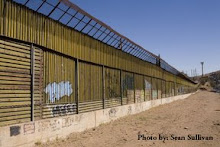The Texas Border Coalition issued the following press release in response to word from U.S. Customs and Border Protection that when they "walk the line" that the border wall will take through South Texas communities, residents of those communities, including the owners of land that the wall will bisect, will be kept out.
EAGLE PASS, Texas (Nov. 10, 2008) – A coalition of Texas border mayors, county judges and economic development associations today slammed a U.S. Customs and Border Protection (CBP) agency decision to shut Rio Grande Valley landowners out of federally-required talks over the border wall in Texas.
Members of the Texas Border Coalition (TBC) also condemned a CBP decision to continue land acquisition near Roma, Rio Grande City and Los Ebanos even though the agency announced last week that it would indefinitely halt construction of moveable fencing near the communities.
"TBC is dumbfounded by CBP's continued resistance to consultation with local landowners and the community, and by CBP's unjustifiable demands for secrecy," Eagle Pass Mayor and TBC Chairman Chad Foster said in response to a letter from David Pagan, an agency official.
"Equally disturbing, CBP is continuing to pursue legal action to condemn the land of the people in Roma, Rio Grande City and Los Ebanos for a fence that the International Boundary & Water Commission won't support," Foster said. "With our nation adding $1 trillion this year to our $10 trillion national debt, this a gross waste of money at a time when the American taxpayer can least afford it."
Last week, CBP informed coalition members that construction of moveable fencing would be delayed at least until next year because the IBWC had raised concerns that the structure could increase the potential for flooding in those communities.
Meanwhile, TBC and Homeland Security officials agreed in April to participate in a series of fence site tours in the Rio Grande Valley, known as "walk the line," to help satisfy federal requirements outlined in the Consolidated Fiscal 2008 Appropriations Act.
Under the law, homeland security officials are obliged to consult with the Secretary
of the Interior, the Secretary of Agriculture, states, local governments, Indian tribes,
and property owners in communities where the wall is to be built. The point is to minimize the barrier's impact on Rio Grande Valley communities and residents from an environmental, cultural and economic standpoint.
The coalition had hoped the tour would take place before the congressionally imposed fence construction deadline of Dec. 31.
But on Nov. 4, Foster said, CBP officials told TBC that attendance would be limited to coalition members only and that individual landowners or their attorneys would not be allowed to "walk the line."
Foster said he believes CBP officials balked because they fear effective consultation
with TBC might be compromised if the agency was forced to show its hand on individual segments of fencing in the presence of opposing landowners. These fears are "inappropriately thin-skinned," he asserted.
"The idea that CBP would expressly prohibit attorneys representing landowners from walking the line when the government's legal actions threaten the rights and liberties of landowners violates the concept of the right to counsel embodied in the Bill of Rights," Foster said.
Foster said TBC will ignore the agency's demands and open its membership to affected Texas landowners who reside along the wall's 270-mile path if CBP insists on shutting them – or their attorneys – out of the consultation process.
"We will not retreat from our insistence that the government consult with our communities and landowners `to minimize the impact on the environment, culture, commerce, and quality of life' as the law requires," he added.
The Texas Border Coalition (TBC) is a collective voice of border mayors, county judges, economic development commissions focused on issues that affect more than 6 million people along the Texas-Mexico border region and economically disadvantaged counties from El Paso to Brownsville. TBC is working closely with the state and federal government to educate, advocate, and secure funding for transportation, immigration and ports of entry, workforce and education and health care. For more information, visit the coalition Web site at http://www.texasbordercoaltion.org/.
Tuesday, November 11, 2008
TBC Dumbfounded by CBP `Demands for Secrecy' Over Border Fence Talks, Land Acquisitions
Subscribe to:
Post Comments (Atom)



No comments:
Post a Comment